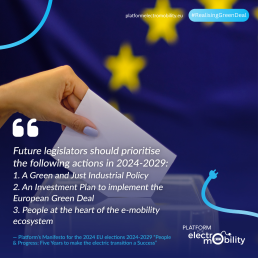Manifesto First Pillar
A Green and Just
Industrial European Policy

One of the richest ‘urban mines’ available to Europe is the supply of old batteries and other waste materials. By investing in integrated recycling and repurposing facilities for collecting, dismantling, recovering or reusing valuable metals from batteries, Europe can, by 2040, secure a large share of the metal resources it needs for battery production. Such an approach not just reduces waste, it is also scalable, preserving and reusing precious raw materials and keeping a greater proportion of them within Europe, increasing our strategic autonomy.
The overall concept of Europe keeping potentially valuable waste within its borders is one that should be widely adopted. Environmental recycling standards vary; exporting waste for processing to locations without equivalent standards undermines our own attempts to reduce environmental impacts. The EU should encourage recycling by establishing a harmonised approach to the intra-EU shipment of spent batteries. All. Executed properly, this can make Europe competitive in battery recycling, ensure the highest environmental standards and help create a flourishing recycling industry in the future
Resilient, affordable renewable energy will be key to a successful industrial policy; however, this demands that the correct grid assets are in place. With a European Grids Package, Europe can refresh and upgrade its infrastructure to meet the demand to accommodate higher levels of renewable energy. Although this will require investment, doing so will allow Europe to tap into its future grid asset – electric vehicles. It will accelerate the connection of chargers and other Green Deal enabling technologies and allow Europe to tap into the huge energy storage potential offered by electric vehicles.
Europe must also go further than simply reducing vehicle engine emissions; it needs a more-holistic approach to reducing the environmental footprint of all road vehicles. This means decarbonising manufacturing materials, increasing manufacturing efficiency and maximising the circularity of the materials used. Introducing digital product passports, revamping EU products policy to reduce environmental footprints and committing to deliver a strong end-of-life vehicles regulation based on low carbon and recycled materials, will be the key drivers for such change in the years ahead.
Finally, while a renewed European industrial policy has focused on key components and sub-systems, it is important that it considers the full scope of the mobility industries’ value chains supporting their global competitiveness as they address the green transitions.

